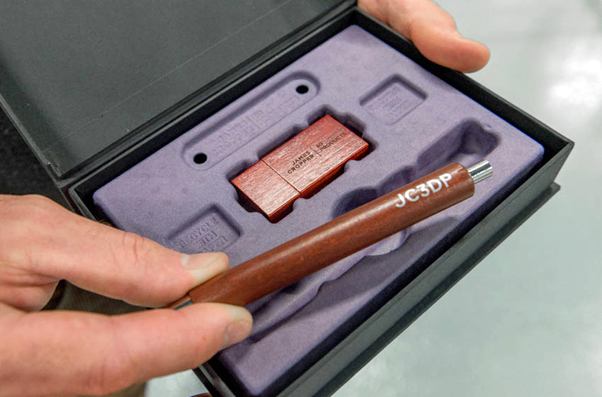Packaging Innovation Helps Reduce Christmas Gift Landfill
An innovative U.K. packaging producer, James Cropper 3D Products, is helping in the annual battle against Christmas landfill by making a sustainable alternative to plastic in gift packaging. The company, which is based in Burneside, near the Lake District, launched this year. The company is part of James Cropper PLC, which has already attracted international attention for developing the world’s first coffee cup recycling plant.
The company makes molded paper packaging, which can be recycled with household paper and offers a sustainable alternative to plastics—including those used in gift packaging at Christmas.
The wood pulp used to make the packaging comes from either Forest Stewardship Council (FSC) or Programme for the Endorsement of Forest Certification (PEFC) accredited forests, which contribute to maintaining biodiversity and capturing carbon dioxide.
Color scientists at James Cropper can match molded paper to literally any color—a key factor in motivating global brands to make the switch from plastic. James Cropper Chief Technology Officer Patrick Willink said molded paper could help reduce the amount of waste going to landfill at Christmas by providing an easily recyclable alternative to plastic packaging.
Around 125,000 metric tons of plastic packaging are sent to landfill in the U.K. at Christmas, according to DEFRA. DEFRA figures also show only 31.6% of plastic used in the U.K. is recycled, compared with 89.4% of paper.
According to Willink, "molded paper is very attractive for brands looking for an alternative to internal plastic packaging for gift sets, gift boxes, and other product packaging. "Gift packaging, in particular, is all about providing a special brand experience for the people who buy your products. It has been difficult to find an alternative to plastic which can do this in the past.
"Moulded paper packaging is easily recyclable and uses wood pulp sourced from sustainably managed forests. But it does not require brands to compromise—in fact, it can enhance the experience for consumers in terms of color, tactility, and technical features such as embossing.
"In the past it has been difficult to reflect the range of colors that are available in plastic. However, at our color lab we are now able to offer molded paper in any color, which means it has become a real viable alternative for use across a range of sectors including luxury drinks, health and beauty, and consumer electronics or e-retail.
"Molded paper also has a warmth and texture that makes it attractive to brands and consumers who increasingly value that connection with nature and sense of authenticity.
"The important thing is that it is making it easier for brands to use molded paper as a true alternative to plastic. Considering the comparative recycling rates for the two materials, we hope this will mean less waste from packaging going to landfill during the Christmas period in the future."
Willink said James Cropper 3D Products, which launched in September, is already working with a number of well-known brands looking to use more sustainable materials in their packaging. "We know that sustainability is becoming more and more of a priority for brands who want to appeal to environmentally conscious customers," he said. "Our molded paper is designed to answer this need while adding to brand experience and their brand story."
TAPPI
http://www.tappi.org/

